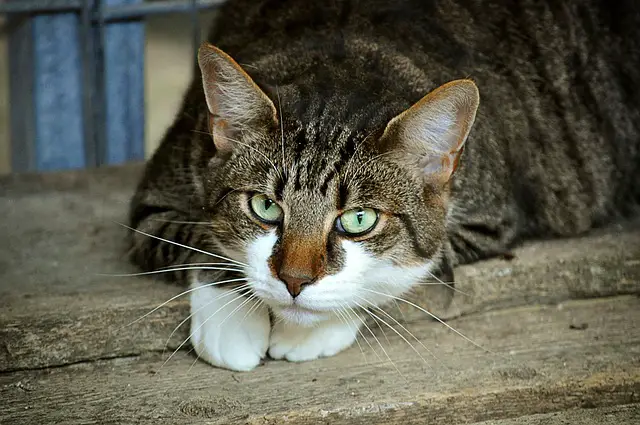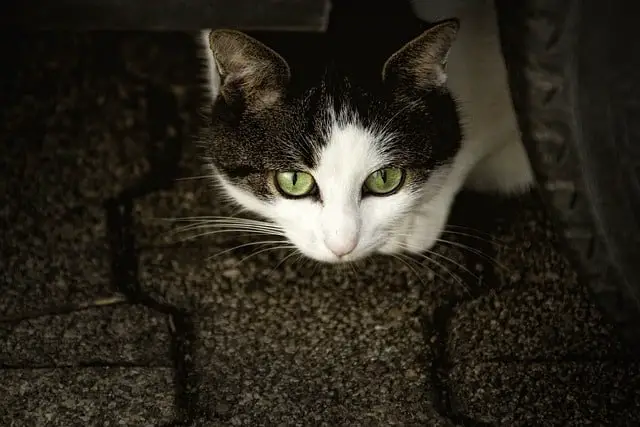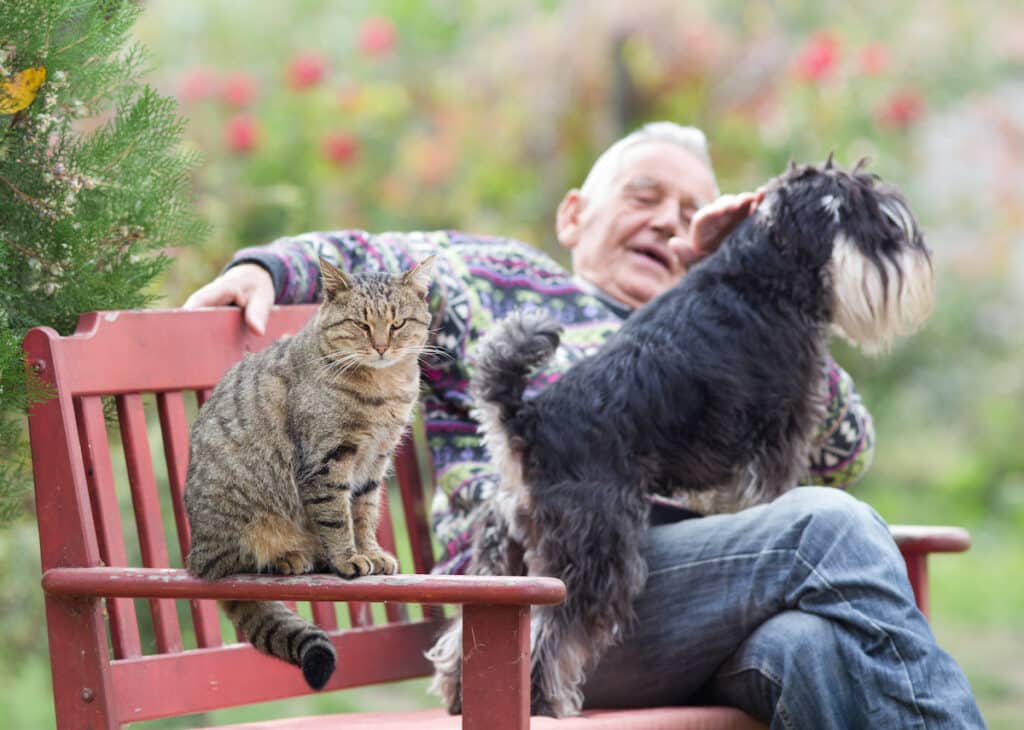Cats are mysterious creatures. They can often appear aloof and independent, but that doesn’t mean they don’t experience strong emotions like jealousy. While cats may not show their jealousy in the same way that humans do, there are some signs and behaviors that can indicate that a cat is feeling jealous.
What is Jealousy?
Jealousy is a complicated emotion. It is a form of fear, worry, and anger that is triggered when someone feels that they are being threatened by a rival. Typically, jealousy is associated with romantic relationships, but it can occur in other contexts as well. For example, a cat may become jealous if they feel that they are not getting enough attention or affection from their owner.
What are the Signs of Jealousy in Cats?
There are several signs that can indicate that a cat is feeling jealous. Here are some of the most common signs of jealousy in cats:
1. Aggression
Aggression in cats is a sign of jealousy and can be a difficult behavior to manage. Cats are territorial animals and can become jealous when they feel that their territory is being threatened. This can manifest in aggressive behavior such as biting, scratching, and hissing. While this behavior is often seen as a sign of aggression, it is actually a sign of fear and insecurity.
2. Excessive Meowing
While meowing is a normal behavior for cats, excessive meowing can be a sign of jealousy.
First, it’s important to understand why cats meow in the first place. In general, cats meow to communicate their needs, such as when they are hungry, want attention, or want to be let out of the house. When cats meow excessively, however, it can be a sign that something is wrong.
One of the most common causes of excessive meowing is jealousy. Cats are very territorial creatures, and they don’t like it when their routine or territory is disrupted. If a new cat is introduced into the home, or if the cat’s owner starts spending time with a new pet or person, the cat may start meowing excessively as a way of expressing their jealousy.
It’s also important to note that cats can get jealous of other cats, too. If the cat’s owner is paying too much attention to another cat, or if there are multiple cats living in the same home, the cat may start meowing excessively in order to express their jealousy.
3. Loss of Appetite
Loss of appetite is a common indicator of jealousy in cats. While cats don’t always show their emotions in the same ways as humans do, a loss of appetite can be a sign that your feline friend is feeling jealous. Jealousy can arise when cats feel like they are being replaced by another pet, person, or object.
If your cat has been spending less time with you or has stopped eating, it could be a sign that they are feeling jealous. Cats are very territorial creatures and can become easily threatened by anything they perceive as a threat to their relationship with you.
4. Changes in Grooming Habits
When cats are feeling jealous, they may start to groom themselves more frequently than usual. This is a way for them to feel comforted and secure. Cats will lick themselves, groom their fur, and often purr in an attempt to calm down. Additionally, cats may start to groom their owners or other cats in an effort to show that they are the “top cat”.
5. Marking Territory
Cats are territorial animals, so they feel the need to stake out their turf and make sure other animals know it belongs to them. By marking their territory, cats are essentially saying, “This is mine. Don’t mess with me.”
Cats don’t just mark their own territory, either. They will often mark the territory of other cats they see as a threat. This is usually done to ward off rival cats, as the scent of their own urine or scent glands will typically be enough to keep the rival cat away.
If you have multiple cats in the home, you may notice that one or more of them are more prone to marking their territory than the others. This is usually because they feel threatened by the other cats in the house, and they’re trying to establish their dominance over them.
Marking territory is a perfectly natural behavior for cats, but it can be annoying and destructive if not managed properly. If you notice that your cats are marking excessively, it’s important to take steps to address the underlying cause. This could mean introducing changes to the environment, such as creating more individual spaces for each cat, or providing more mental stimulation. Additionally, providing plenty of resources such as scratching posts and toys can help reduce territorial behavior.

What Causes Jealousy in Cats?
Jealousy is a feeling that runs deep in many animals, including cats. Cats can feel jealous of another cat, animal, or person that they perceive to be getting more attention or affection than they are. Jealousy in cats can manifest itself in a variety of ways, from hissing, growling, and swatting to more subtle behaviors like avoidance or refusal to engage. Here, we’ll look at some of the common causes of jealousy in cats and what you can do to help your cat work through their feelings.
First, cats can become jealous if you show more attention to another cat or pet in the house. Have you ever noticed your cat getting jealous when you pet or play with another cat? This is normal behavior, and it’s important to give them equal amounts of attention and affection.
Second, cats can become jealous when you bring home a new pet or even a baby. Cats are creatures of habit and they form strong attachments to their owners. When someone or something else enters their life, it can cause them to become jealous and insecure.
Third, cats can become jealous if you bring in a new item of furniture or a new toy. Cats tend to be territorial and they may feel threatened if you bring in something new that they aren’t used to. This can cause them to feel jealous and insecure.
Finally, cats can become jealous if you spend too much time away from home. Cats are very social creatures and they thrive on companionship and attention. If you’re away from home all day, your cat may feel lonely and neglected, which can lead to feelings of jealousy.

How Can You Help?
Jealousy in cats can be a common behavior that can be destructive and disruptive, often leading to aggression and other issues. Fortunately, there are steps you can take to help reduce jealousy in cats.
- Provide enough resources. Make sure your cats have plenty of food, water, litter boxes, toys, and places to scratch and hide so that they don’t have to compete for resources.
- Spend quality time with each cat. Quality time with your cats can help them feel more secure and less jealous of each other. Give each cat their own time in the spotlight and provide affection and attention to both of them.
- Ensure healthy play. Make sure that your cats have plenty of opportunities to play together, but also provide them with their own toys and activities. This will help keep them from feeling jealous of each other and can help reduce competition.
- Train them to be more tolerant. With patience and positive reinforcement, you can train your cats to be more tolerant of each other. This can help reduce jealousy and can also teach them to respect each other’s boundaries.
- Separate them when necessary. If your cats are having a particularly difficult time getting along, you may need to separate them for a while. This can be a temporary measure to help reduce the jealous behavior.
With some patience and understanding, you can help reduce jealousy in cats. It’s important to remember that cats are social animals, so it’s important to provide them with plenty of opportunities to interact with each other and form strong bonds.
Conclusion: Do Cats Get Jealous?
Cats can experience strong emotions like jealousy, even if they don’t show it in the same way that humans do. If you think that your cat is feeling jealous, there are steps that you can take to help them. Spend time with them, introduce new pets slowly, create a routine, and ignore bad behavior. With a little patience and understanding, you can help your jealous cat feel secure and loved.
FAQs: Do Cats Get Jealous?
If you’re a cat lover, you may have noticed that cats often get jealous if you pet another cat. While cats typically don’t display the same kind of jealous behavior that humans do, they can still be territorial and possessive of their owners.
Cats are incredibly intuitive animals, and they can sense when their human’s attention is being diverted to another feline. This can trigger feelings of jealousy, which can manifest in a variety of ways. For example, a jealous cat may display aggressive behavior towards the other cat, or they may start meowing or even swatting at the other cat.
Many cats show possessiveness towards their owners, and while it might not always be obvious, it’s a sign that your cat is feeling secure and comfortable in their environment.
The simple answer is yes, cats can and do get jealous. Just like humans, cats experience jealousy when they feel that they are being neglected or replaced. Cats may become jealous if they perceive that their owner is giving more attention to another cat in the household. This can manifest in a variety of behaviors such as aggressive behavior, sulking, or even inappropriate urination.
Cats show their anger through a variety of behaviors, including hissing, growling, and swatting. They may also display more subtle signs, such as flattening their ears, dilating their pupils, and arching their back.
One of the most common signs of a mad cat is hissing. Cats will hiss when they feel threatened or scared, and it’s usually a sign that they want you to back off. If your cat hisses at you, give them some space and let them cool off.
Growling is another sign of a cat’s anger. Cats may growl if they feel threatened or if they don’t want you near them. If your cat growls at you, back away slowly and give them some space.
Cats may also show their anger through swatting. This is when they hit out with their paw, usually at your hands or feet. Swatting is a warning sign that your cat is unhappy, so it’s best to leave them alone and give them time to calm down.
Finally, cats may use more subtle body language to show they are mad at you. If you notice your cat flattening their ears, dilating their pupils, or arching their back, it’s a sign that they are feeling uncomfortable. Again, the best thing to do is to give them some space and let them calm down.
Cats have an incredible sense of smell, which can be used to identify various smells and even detect the scent of other cats. So, the answer to the question “Can cats smell other cats’ scent on you?” is yes.
Cats have scent glands located on their cheeks, chin, forehead, and tail. When they rub against something, they leave behind their own scent. That’s why cats often rub against people and furniture. This scent is used to mark their territory and let other cats know where they have been.
Cats are also able to detect the scent of other cats on humans. This means that if you pet another cat, your cat may be able to smell that cat’s scent on you. Your cat won’t necessarily react negatively to the scent, but it may be curious about it.
If you want to avoid your cat detecting the scent of other cats on you, there are a few things you can do. First, make sure you wash your hands after petting another cat. This will help reduce the amount of scent left behind on your hands. Second, avoid wearing clothing that has been in contact with another cat. Lastly, be sure to bathe regularly. This will help reduce the amount of scent that lingers on your body.














